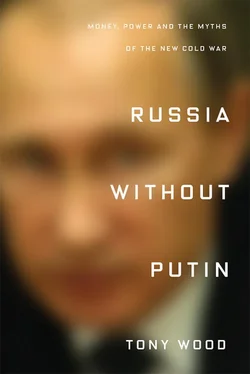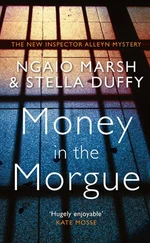These kinds of speculation share with most Western discussions of contemporary Russia a tendency to credit Putin with an almost demiurgic power, as if he had constructed the system from scratch – fashioning it according to his desires the way a spider weaves its web. But the system is much less Putin’s individual creation than the cumulative outcome of Russia’s post-Communist transformations. And though he has undeniably had a strong influence on the way the system operates, some version of it is likely to far outlast Putin himself. What this means in turn is that we need to look beyond Putin to understand what that system is, how it really works, and what its consequences are for Russia and for the wider world.
CHAPTER 1
The Man and the System
WHO IS VLADIMIR PUTIN? And what can his personal background and experiences tell us about the country he has governed for close to two decades? There is a strange disproportion in the ever-expanding literature on the man: although a great deal has been published about him, we still know relatively little about his inner life, especially compared with other major global leaders. {1} 1 The most comprehensive accounts of Putin’s background and career are Steven Lee Myers, The New Tsar: The Rise and Reign of Vladimir Putin , New York 2015, and Fiona Hill and Clifford Gaddy, Mr Putin: Operative in the Kremlin [revised and expanded edition], Washington, DC 2015. Other works I have drawn on here include Masha Gessen, The Man without a Face: The Unlikely Rise of Vladimir Putin , London 2012; Anna Arutunyan, The Putin Mystique , London 2014; Angus Roxburgh, The Strongman: Vladimir Putin and the Struggle for Russia , London 2011; Allen Lynch, Vladimir Putin and Russian Statecraft , Washington, DC 2011; and Richard Sakwa, Putin: Russia’s Choice [second edition], London 2008.
He is both ubiquitous and elusive, a permanent public presence whose private world remains largely closed off. Still, there are a fair number of clues. The basic facts of his biography are well known, and were laid out in First Person , a book of autobiographical interviews published shortly after he became president in 2000. Surprisingly, almost two decades on, this carefully crafted document remains the principal source on his early life and career. {2} 2 Vladimir Putin et al., First Person: An Astonishingly Frank Self-Portrait by Russia’s President , London 2000.
Born in 1952 in what was then Leningrad, Putin grew up in a communal apartment with his working-class parents – his father was a wounded war veteran, his mother a factory worker. He himself recalls the tough milieu of the dvor , the courtyard between apartment blocks where childhood arguments were often decided by shoves or fistfights. Putin’s readiness to see insults, a kind of constant, coiled defensiveness, has often been traced back to lessons learnt on Leningrad’s streets. As a boy, he dreamed of becoming a spy. Cult Soviet TV programmes such as Shchit i mech (Shield and Sword) painted a romanticized picture of intelligence agents, and Putin claims he grew up wanting to imitate the exploits of the programme’s undercover hero. After studying law at Leningrad State University from 1970–75, Putin joined the KGB and worked for the agency for several years in his native city, then spent a year at the Red Banner Institute, the KGB’s intelligence academy in Moscow, from 1984–85.
In 1985, he was posted to Dresden, where by his account he carried out ‘the usual intelligence activities: recruiting sources of information, obtaining information, analysing it, and sending it to Moscow.’ The four and a half years he spent in the GDR were ones of dizzying change in the USSR, as Gorbachev’s perestroika launched a far-reaching process of reform. In retrospect it seems significant that Putin missed this time of political and cultural ferment – the brief window when it still seemed possible that the old system could gradually be changed for the better. Eventually, though, the reforms – and in particular the economic situation – escaped the Communist Party’s control, culminating in the disintegration of the Soviet Union at the end of 1991.
In the meantime, the USSR had withdrawn its support for the Communist regimes of the Eastern Bloc, which toppled one after another in the closing months of 1989. Putin, who shared a building in Dresden with members of the Stasi, saw these events unfold with alarm. He recounts burning papers ‘night and day’ and confronting a hostile crowd outside the door of his workplace. In the view of many experts, this experience led him to associate mass politics with the threat of disorder – a connection that might explain his apparent fear that Russia would be contaminated by the ‘Colour Revolutions’ that overthrew a string of post-Soviet regimes in the mid-2000s. (The same repulsion was evident in the Kremlin’s virulent response to the Maidan protests in Ukraine in 2013–14.) There can be no doubt, in any event, that the fall of Communism was profoundly disorientating for Putin. Perhaps most bewildering of all was the lack of instructions or communications from Moscow. ‘I got the feeling then’, he later recalled, ‘that the country no longer existed. That it had disappeared.’ {3} 3 Putin et al., First Person , pp. 69–70, 79.
Putin has famously spoken of the fall of the USSR as a ‘geopolitical catastrophe’. Along with many other Russians of his generation, he seems to have felt keenly the sense of national humiliation that the Soviet collapse brought; one of his former spin doctors has described Putin as part of ‘a very extensive, but politically opaque, unrepresented, unseen layer of people who after the end of the 1980s were looking for revanche ’. {4} 4 Gleb Pavlovsky, ‘Putin’s World Outlook: Interview by Tom Parfitt’, New Left Review , 88, July–August 2014, p. 56.
The resentment only increased during the 1990s, when the former superpower found itself mired in endless economic crises and political turbulence, and the state apparatus turned into a chaotic jumble of factions. But this lingering bitterness was not the only thing that defined Putin’s experience of the 1990s: the time he spent in the murky, overlapping realms of post-Soviet government and business also shaped his perceptions of how the new capitalist system really worked.
Putin returned to Leningrad in March 1990, and soon began working for his former law professor Anatoly Sobchak, first at the university and then in the city government. Sobchak was elected mayor in June 1991, at the same moment that the city switched its name back to St Petersburg. Putin was effectively Sobchak’s deputy, and was placed in charge of the city’s Committee for External Relations, making him the point of contact for all the foreign businesses rushing to make deals on one of capitalism’s newest frontiers. The Soviet planned economy had been smashed, and almighty struggles – sometimes literal gunfights – were unfolding over the pieces. The state’s grip on its economic infrastructure, its resources, even its borders had become shaky, and huge profits were being made from a whole range of illicit activities, from smuggling to extortion, from fraud to the seizure of state assets.
As one of the functionaries responsible for St Petersburg’s economy, Putin issued licenses to thousands of new busineses, and saw for himself how the grey area of legality left behind by the state’s collapse was creating fortunes for a sharp-elbowed few. He later described his role, euphemistically, as having to ‘solve a fairly large number of problems and tasks of interest to various business structures’. {5} 5 Quoted in Hill and Gaddy, Mr Putin , p. 149.
The city itself joined in the market free-for-all, forming dozens of joint-venture enterprises – one of which, overseen by Putin, involved a 51 per cent stake in all St Petersburg’s casinos, and apparently resulted in millions of dollars in cash being funnelled into private pockets rather than the city’s coffers. {6} 6 Gessen, Man without a Face , p. 120; Myers, New Tsar , pp. 78–79.
Читать дальше












